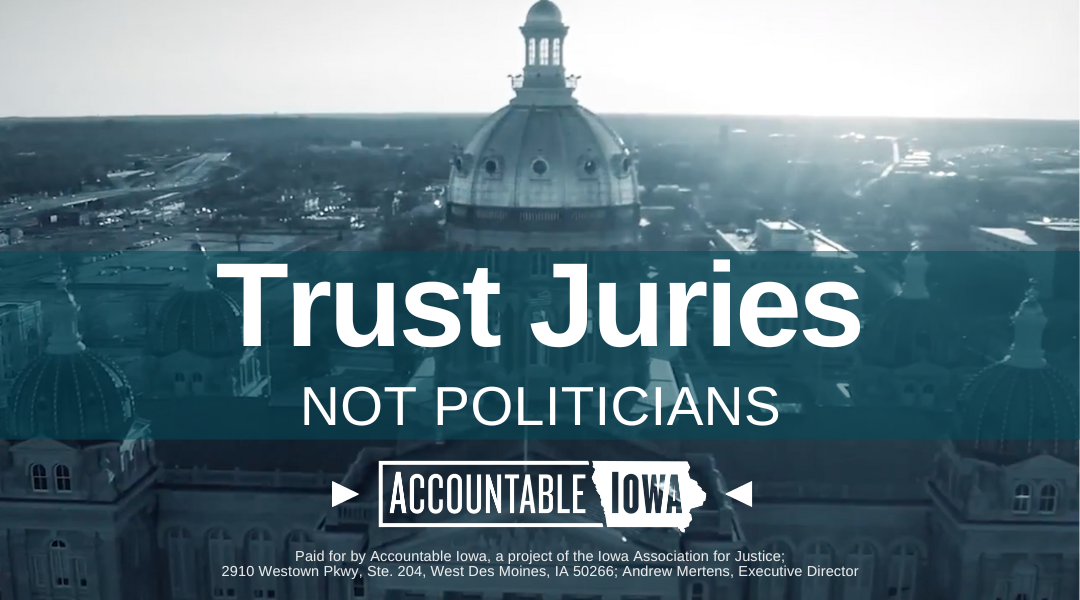The eighth week of this year’s session is known as “funnel week” in the legislature. This week is the first legislative deadline of the year. All Senate policy bills must have passed through committee in order to be considered for the rest of the year.
Because it was funnel week, subcommittees and committees worked diligently to move bills through the process. One of these bills was Senate File 304. Iowa’s teacher diversity has room to improve and SF 304 addresses that need by updating the Teach Iowa Program to help recruit minority teachers to Iowa and bring qualified teachers into other areas of need. The Teach Iowa Program currently provides awards of up to $4,000 a year, for up to five years, to qualified teachers to teach in designated shortage areas. The awards are prioritized to teachers renewing from a previous year, followed by recent graduates. SF 304 increases the yearly grant maximum to $7,500 and adds a new section in the priority list: applicants who are minorities. Adding this new prioritization level is important because studies show low-income minority students perform better in school when they have even one teacher with a shared ethnic background.
The Senate has also discussed recently a number of bills commonly referred to as “back the blue” bills. Iowans have seen the hard work law enforcement does to protect our communities and the dangerous attacks some of them have endured. SF 497 provides much needed legal protections for law enforcement officers. The bill raises the penalty for those who assault a law enforcement officer, increases penalties or adds levels for certain disorderly conduct, unlawful assembly, and riot crimes, and also defines the act of damaging any publicly owned property, including a monument or statue, to be criminal mischief in the 2nd degree. The bill also ensures the holding period for a person arrested for criminal mischief in the 2nd degree, rioting, unlawful assembly, or disorderly conduct shall be for at least 24 hours. This bill does not punish protesters and does not infringe on the First Amendment. It only punishes those who have committed a crime and protects those dedicating their lives to serving their community.
Senate File 476 aligns Iowa with the qualified immunity standard set by the U.S. Supreme Court for law enforcement officials. Qualified immunity is not blanket protection for illegal activity. Rather it ensures our law enforcement professionals are not being harassed or distracted, or second-guessing their action with concerns of being sued. It weighs the actions of an officer against the knowledge and awareness of the law. It also amends the Peace Officer, Public Safety, and Emergency Personnel Bill of Rights to allow an officer who suffered from a person knowingly filing a false complaint to bring a private cause of action and pursue civil remedies. Additionally, it makes an officer’s statement, recordings, or transcripts of any interview or disciplinary proceedings and any complaints against an officer a confidential record, while also giving law enforcement officers the ability to have their name redacted from documents available for public access online.
Over the past year a movement has emerged to defund police across the country. Senate File 479 protects law enforcement agencies from these targeted budget restrictions, or defunding. It denies state funds to an entity that decides to reduce law enforcement budgets without any justification or budgetary reason to do so. State funds would be denied until the funding has been re-established. The bill provides exemptions for certain reductions in police funding like reduced population, merger or consolidation, lower cost of entry-level law enforcement hiring, and one-time capital or equipment purchases in the prior fiscal year. It does not take away local decisions, but the state will not support a city defunding their police.
This week, SSB 1232 passed out of the Judiciary Committee. This bill makes a number of changes to Iowa’s gun laws, the most important being allowing Iowans to carry firearms without a government permission slip.
This bill says a person no longer needs a permit to lawfully carry or transport a dangerous weapon, either open or concealed, including a loaded firearm. It also allows a buyer of a pistol or a revolver have either a permit to acquire or a permit to carry, or a satisfactory national instant criminal background check, and creates the crime of carrying firearms on school grounds, making it a class “D” felony. A number of exceptions are created with it, including people specifically authorized by the school, peace officers, or any person carrying in a vehicle where the weapon is unloaded in a fastened case or is inaccessible to the persons in the vehicle. Additionally, the bill allows EMS personnel to acquire a professional permit to carry if they are attached to a law enforcement tactical team, requiring law enforcement-level training and certification, and requires the Department of Public Safety to adopt rules expanding available training opportunities and licensing.
This week, I chaired SF 508 in subcommittee. This bill would create an electronic dashboard, similar to the one used to report COVID19 cases, to timely report the number of abortions performed in the state. The accessible information would be limited and reported on an aggregate basis to ensure that personal, private information is protected. This information has been collected since the 1990s but is currently only reported on an annual basis. The new dashboard, as proposed, would be a means of making government transparent and information accessible. The bill did not make it through the funnel this year. I will continue to work with my colleagues in the Senate over the next year to improve this bill and, hopefully, bring it up during the 2022 session.
Next week, the Senate will see a lot of debate as we work on moving bills over to the House for their approval.












